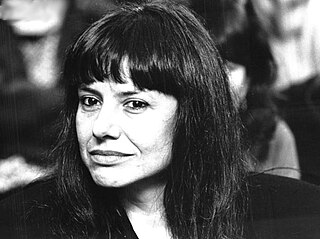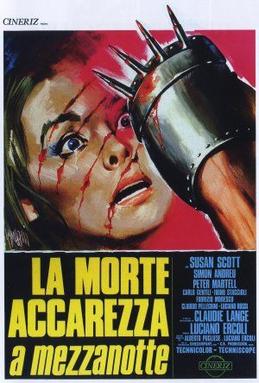Related Research Articles

Dacia Maraini is an Italian writer. Maraini's work focuses on women's issues, and she has written numerous plays and novels. She has won awards for her work, including the Formentor Prize for L'età del malessere (1963); the Premio Fregene for Isolina (1985); the Premio Campiello and Book of the Year Award for La lunga vita di Marianna Ucrìa (1990); and the Premio Strega for Buio (1999). In 2013, Irish Braschi's biographical documentary I Was Born Travelling told the story of her life, focusing in particular on her imprisonment in a concentration camp in Japan during World War II and the journeys she made around the world with her partner Alberto Moravia and close friends Pier Paolo Pasolini and Maria Callas. In 2020 she adheres to Empathism.

Daniela Sanzone is an Italian and Canadian journalist and writer. She lives in Toronto where she is a Teaching Assistant and a PhD candidate at York University in Communication and Culture, Graduate joint program at York University and Toronto Metropolitan University. Her research interests are Canadian broadcasting policies, Journalism, and Ethnic Media, also known as Third Language Media or Ethnic Minority Media. For many years she was a news anchor and a reporter for the Italian News at Omni Television, a Canadian multicultural channel owned by Rogers Media, and the on-air host of the daily program Pomeriggio Italiano. In 2016 she published her first novel, "La guerra secondo Michele".

Benedetta Barzini is an Italian photomodel, journalist, writer, educator, feminist. In the 1960s she made a brilliant career as a model in the United States, shooting for Irving Penn, Richard Avedon, Ugo Mulas, Henry Clarke (photographer), Andy Warhol, became the first Italian on the cover of American Vogue and in 1965 Barzini's photograph graced the cover of the first issue of Italian Vogue, but by the end of the decade was disillusioned with the fashion world. Upon returning to Milan, she became a member of the Italian Communist Party and a radical feminist. Author of over 5 books, she lectured at three universities for twenty years.

Gastone Moschin was an Italian stage, television and film actor.

Adriana Faranda is an Italian former terrorist, who was a member of the Red Brigades during the kidnapping of Aldo Moro.
Cristina Serafini is an Italian actress.
Marina Confalone is an Italian actress, screenwriter, theatre director, writer, holder of five David di Donatello awards.

La morte accarezza a mezzanotte is a 1972 giallo film directed by Luciano Ercoli. The film was written by Ernesto Gastaldi, Guido Leoni, Mahnahén Velasco and Mannuel Velasco. It starred Susan Scott, Simón Andreu, Peter Martell, Claudie Lange and Carlo Gentili.
Laudomia Bonanni was an Italian writer and journalist. Although she started publishing when she was a teenager, her literary career took off in 1948 when she won a national contest; she went on to be a prolific and award-winning author. The Nobel laureate Eugenio Montale compared her realism to James Joyce’s Dubliners, and other distinguished critics considered her one of the most important and original voices in Italy’s post-World War II literature.

Anna Rita Del Piano, real name Anna Rita Viapiano, is an Italian actress and theater director.

Silvia Ballestra is an Italian writer. In 2006 she won the Rapallo Carige Prize.

Bruno Mario Lavezzi is an Italian singer-songwriter, composer, record producer and guitarist.
Giovanni (Gianni) Bongioanni was an Italian film director, screenwriter, cinematographer, camera operator, editor, writer and occasional actor. He was one of the earliest directors to adopt an authentic, neo-realistic approach to Italian film-making, and his film La svolta pericolosa (1959) is considered the first Italian television series. In addition, Bongioanni was actively involved in the Italian TV and radio broadcasting industries, in which he worked for several years before making his first feature film, Tre per una rapina (1964).
Diane Loretta Bond is an American former actress and feminist artist and writer, best known for her minor roles in movies during the 1960s. She appeared in films like In Like Flint (1967), House of 1,000 Dolls (1967), A Swingin' Summer (1965), Pajama Party (1964) and as a beach extra in the TV series The Beverly Hillbillies. Bond also had several uncredited roles such as an air hostess in Seconds (1966) and a body double for Claudia Cardinale in Blindfold (1965). After relocating to Italy and studying art, she became an artist using mainly feminist issues to fuel her creativity.

Giuliana Berlinguer was an Italian director, screenwriter, and novelist.

Romina Falconi is an Italian electropop singer-songwriter.

Giulia Occhini, known as "La Dama Bianca", was the lover of champion cyclist Fausto Coppi in a scandalous extramarital affair of the 1950s.
Elvira Badaracco was an Italian politician, socialist, writer and feminist activist.
Lapis was a feminist magazine based in Milan, Italy, with the subtitle Percorsi della riflessione femminile. It was in circulation between 1987 and 1996.
Lea Melandri is an Italian feminist scholar, journalist and writer. She is one of the leading feminists in Italy and is part of the second-wave feminist movement. She has established various magazines and published books on feminist theory.
References
- ↑ Kuhn, Annette; Radstone, Susannah (1994). The Women's Companion to International Film. University of California Press. p. 223. ISBN 0-520-08879-4.
- ↑ Moliterno, Gino (2000). Encyclopedia of Contemporary Italian Culture. CRC Press. p. 317. ISBN 0-415-14584-8.
- 1 2 3 4 Foster, Gwendolyn Audrey (1995). Women Film Directors: An International Bio-critical Dictionary . Greenwood Publishing Group. pp. 268–269. ISBN 0-313-28972-7.
- 1 2 Monti, Adriana (1988). "Introduction to the script of the film Scuola senza fine". In Bruno, Giuliana; Nadotti, Maria (eds.). Off Screen: Women and Film in Italy. Taylor & Francis. pp. 80–82. ISBN 0-415-00857-3.
- 1 2 Giuliana Bruno (1989). "The Image (and the) Movement: An Overview of Italian Feminist Research". Camera Obscura . 7 (2–3): 31–32. doi:10.1215/02705346-7-2-3_20-21-28.